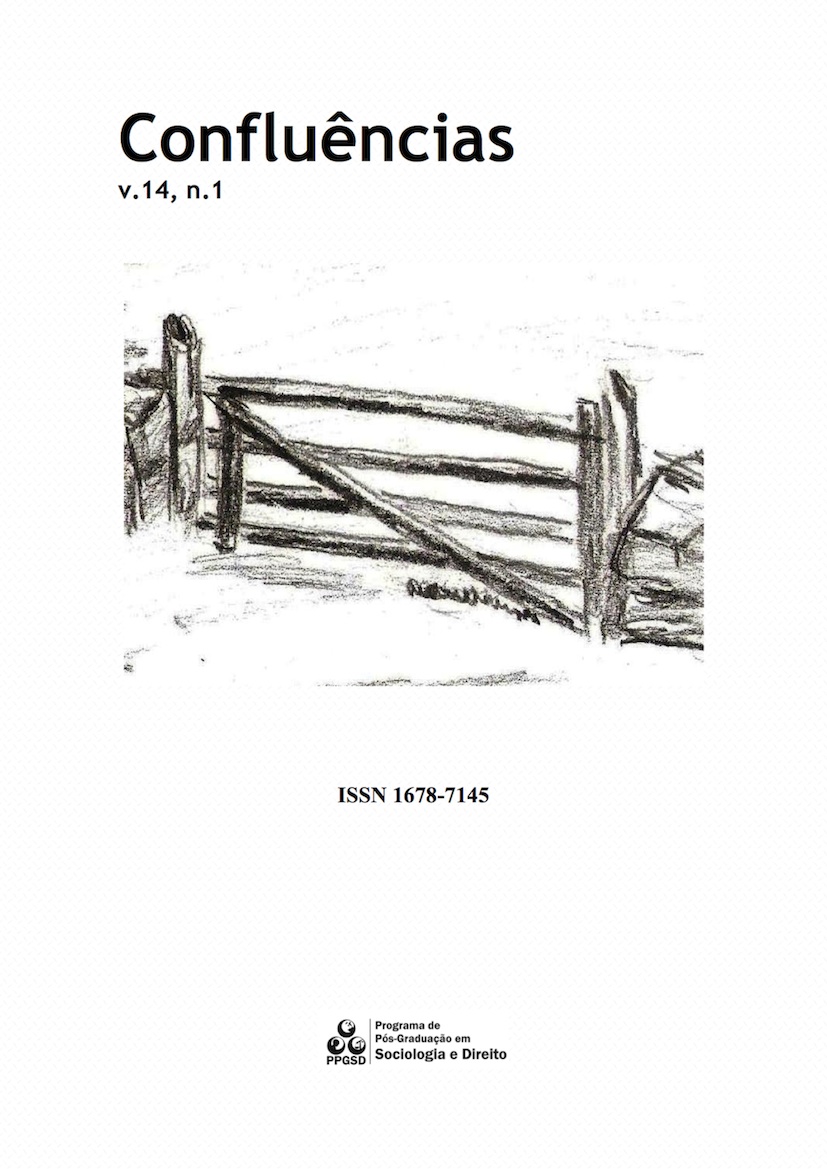Oportunidades e Dilemas do Tratamento dos Resíduos Sólidos no Brasil à Luz da Política Nacional de Resíduos Sólidos (lei n. 12.305/2010)
DOI:
https://doi.org/10.22409/conflu14i1.p298Palavras-chave:
Brasil, Política Nacional de Resíduos Sólidos.Resumo
Os desafios gerados pela crescente produção de lixo impõem aos agentes públicos, privados e à sociedade a necessidade d engajamento em novos esforços na busca por soluções efetivas para o vazamento do lixo e a outros problemas relacionados a essa atividade. Propostas que respondam aos problemas ambientais e sociais, em um único instrumento, ganham destaque nos mais diversos fóruns pois enunciam a possibilidade de mitigação de impactos e promoção de bem estar social de modo mai efetivo e integrado. Este trabalho analisa em que medida a Política Nacional de Resíduos Sólidos (PNRS, Lei n. 12.305), sancionada em Agosto de 2010, preenche esses requisitos. Este estudo mostra que, de um lado, a referida lei se funda no princípio a responsabilidade compartilhada entre governo, empresas e população. Nesse sentido, estimula, por exemplo, o retorno dos produtos às indústrias após o consumo. Por outro lado, obriga o poder público a realizar planos para o gerenciamento do lixo. Ainda, por meio de regulamento específico, também propõe a implantação do programa visando à melhoria das condições de trabalho e às oportunidades de inclusão social e econômica dos catadores de materiais recicláveis. Em termos teóricos, enfim, a lei contempla os principais aspectos da cadeia produtiva de material reciclável e atenta-se para todas as oportunidades, econômicas, sociais e ambientais, originadas por este setor. Contudo, terminamos por contrastar essas oportunidades com o que podem ser obstáculos para a implementação da nova legislação, sugerindo que ela também traz vários dilemas para atingir seus objetivos.
Downloads
Referências
ABRELPE. Panorama dos Resíduos Sólidos no Brasil 2010. São Paulo, 2010.
Ambiente Brasil. Lei que torna a compostagem obrigatória em São Francisco já é um sucesso. http://blog.ambientebrasil.com.br/?p=1094. Publicado em: 22 de outubro de 2009. Acessado em: 04 de junho de 2011. BICCA,Victor. As cooperativas de reciclagem na PNRS. Disponível em: http://www.envolverde.com.br/dialogos/noticias/as-cooperativas-de-reciclagem-na-politicanacional-
de-residuos-solidos/. Acessado em: 17 de jun. 2011.
BRASIL. Lei n.° 12.305, de 2 de agosto de 2010. Institui a Política Nacional de Resíduos Sólidos; altera a Lei no. 9.605, de 12 de fevereiro de 1998; e dá outras providências.
Disponível em http://www.planalto.gov.br/ccivil_03/_ato2007-2010/2010/lei/l12305.htm. Acesso em: 01 de jun. de 2011.
CEMPRE. Política Nacional de Resíduos Sólidos - Agora é lei. São Paulo, 2010. Confederação Nacional dos Municípios. Sancionada a Política de Resíduos Sólidos, saiba o impacto da lei. Disponível em http://www.cnm.org.br/institucional/conteudo.asp?iId=174342. Acesso em: 01 de jun. de 2011.
IETS. Diagnóstico Socioeconômico de Jardim Gramacho. Rio de Janeiro, 2011.
JACOBI, Pedro; TEIXEIRA, Marco Antonio Carvalho. Consórcio Quiriri: Programa Intermunicipal de Tratamento Participativo de Resíduos Sólidos da Região do Alto Rio Negro Catarinense. In: FARAH, Marta Ferreira Santos; BARBOZA, Hélio Batista (Org.). Novas experiências de gestão pública e cidadania. Rio de Janeiro: Editora, FGV, 2001. p. 203-216
JACOBI, Pedro Roberto; BESEN, Gina Rizpah. Gestão de resíduos sólidos em São Paulo.
Estudos avançados, v.25, n.71. São Paulo: Jan./Apr. 2011.
FAGUNDES, Diana da Cruz. Gerenciamento de resíduos sólidos urbanos em Tarumã e Teodoro Sampaio – SP. Soc. nat. (Online) v.21 n.2 Uberlândia: Aug. 2009.
INSTITUTO PÓLIS. Coleta seletiva com inclusão social: Fórum Lixo e Cidadania na Cidade de São Paulo. Experiência e desafios. São Paulo: Instituto Pólis, 2007. 148p.
(Publicações Pólis, 49)
SELUR/ABLP. Gestão da Limpeza Urbana. Um investimento para o futuro das cidades. São Paulo: Selur, ABLP, 2010. Disponível em: http://www.selurb.com.br/upload/estudo_selur_2010.pdf. Acesso em: 10 de Junho 2011.
SINDUSCON. Gestão Ambiental de Resíduos da Construção Civil: a experiência do SindusCon/SP / Tarcisio de Paulo Pinto (coordenador). São Paulo: Obra Limpa: I&T: SindusCon-SP, 2005.
Downloads
Publicado
Edição
Seção
Licença
Os autores mantêm os direitos autorais e concedem à revista o direito de primeira publicação, com o trabalho simultaneamente licenciado sob a Licença Creative Commons Attribution que permite o compartilhamento do trabalho com reconhecimento da autoria e publicação inicial nesta revista. Têm autorização para assumir contratos adicionais separadamente, para distribuição não-exclusiva da versão do trabalho publicada nesta revista (ex.: publicar em repositório institucional ou como capítulo de livro), com reconhecimento de autoria e publicação inicial nesta revista. Possuem permissão e são estimulados a publicar e distribuir seu trabalho online (ex.: em repositórios institucionais ou na sua página pessoal) a qualquer ponto antes ou durante o processo editorial, já que isso pode gerar alterações produtivas, bem como aumentar o impacto e a citação do trabalho publicado.







